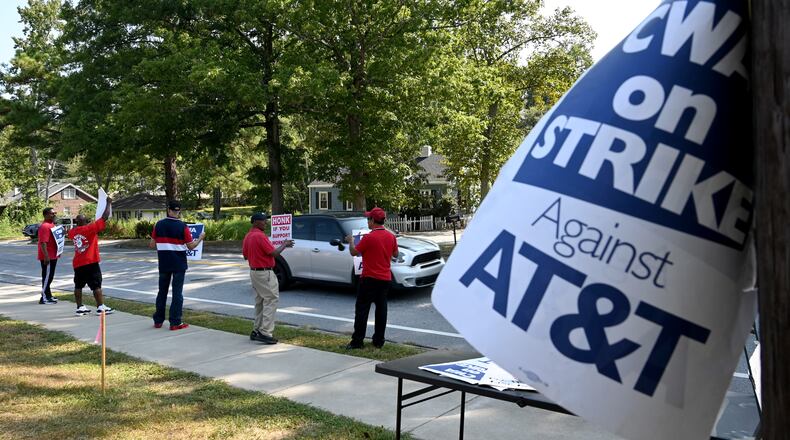The union representing striking AT&T workers in the Southeast has asked that talks with the company no longer involve mediation, contending the company was using that third party to delay progress.
The Communications Workers of America, which represents the roughly 17,000 AT&T workers on strike since Aug. 16, said near-daily negotiations have not brought the sides closer to agreement since the workers’ five-year contract expired Aug. 3.
“We are meeting, but there’s no substance to it,” Richard Honeycutt, CWA vice president for the region on strike, told The Atlanta Journal-Constitution. “They won’t get to the bottom line. We all know there’s a bottom line.”
Dallas-based AT&T officials said in a written statement Tuesday the union’s move was “unexpected.”
“Withdrawing from mediation seems inconsistent with the union’s allegation of unfair labor practices,” an AT&T spokesman said. “This also goes against their stated intention to bargain toward a mutually agreeable resolution.”
The spokesman cited previous contracts reached by AT&T with other unions earlier this year as evidence that it is bargaining “in good faith” toward an accord with the CWA in the Southeast.
The lack of a mediator won’t change the company’s attitude, he said: “As we have said from day 1, we are focused on reaching a fair and competitive agreement that benefits our hard-working employees as quickly as possible, and this won’t change.”
A five-year contract between the CWA workers and AT&T expired in early August and negotiators from the company and the union began meeting to discuss a new pact. But the union called a strike Aug. 16, arguing that the company was only feigning at serious talks.
Negotiators sent by AT&T came to the bargaining table with so little authority that any proposals discussed had to be routed back through corporate channels to higher-ups in the company and vetted, Honeycutt said. The process was tedious and rarely produced a step closer to a deal, he said.
“We want someone at the bargaining table who can really bargain,” he said.
About 2,500 of the striking AT&T workers are in metro Atlanta. But the strikers are all over a region that includes Georgia, Alabama, Florida, Kentucky, Louisiana, Mississippi, North Carolina, South Carolina, and Tennessee.
About the Author
Keep Reading
The Latest
Featured




